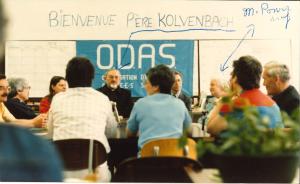Having studied and taught Catholic Social Teaching in Sacred Heart schools, Sister Margaret Mary Power embraced the end of cloister and the opportunity to serve the poor after the Second Vatican Council. She said of her first days in Little Burgundy, “I took a course with the 'avocats populaires' on Bill 26. It was the law which came out in 1969 that gave welfare people the right to a subsistence. They asked me to work with them and so things came together. I also read a good deal about Liberation Theology and felt that, though God is everywhere, He is particularly where the poor are, and I wanted to be where God was. . . I used to encourage giving to charity . . . What I teach now is that we've got to change the world so these people don't need our handouts.”
Margaret Mary served as a delegate and was sustained in her work by the General Chapter in 1970, which declared options for solidarity with the poor and the Third World. She founded ODAS (Organisation d'aide aux Assistes Sociaux). “Our aim is to help welfare people run their own lives. We teach welfare recipients the law and what their rights are. . . We organize workshops where they learn to express themselves.”
Reflecting back on her life in service to the poor, she stated, “I'm a nun because I was seeking God in an absolute kind of way. . . I've been here now since 1973 and I have not changed my ideas. Being here is not as consoling as being able to go to a nice, quiet chapel with flowers which is more conducive to prayer than demonstrating on a street saying, "La taxed' eau, on la paye pas". . . You have to have the faith, the contemplative capacity to find God there and not only in church and in the sacraments. I want to be doing something that will help to liberate people on whatever level I can.”
Quotations from "Sister Margaret Mary Power, R.S.C.J." in The Shamrock and the Shield: An Oral History of the Irish in Montreal.

